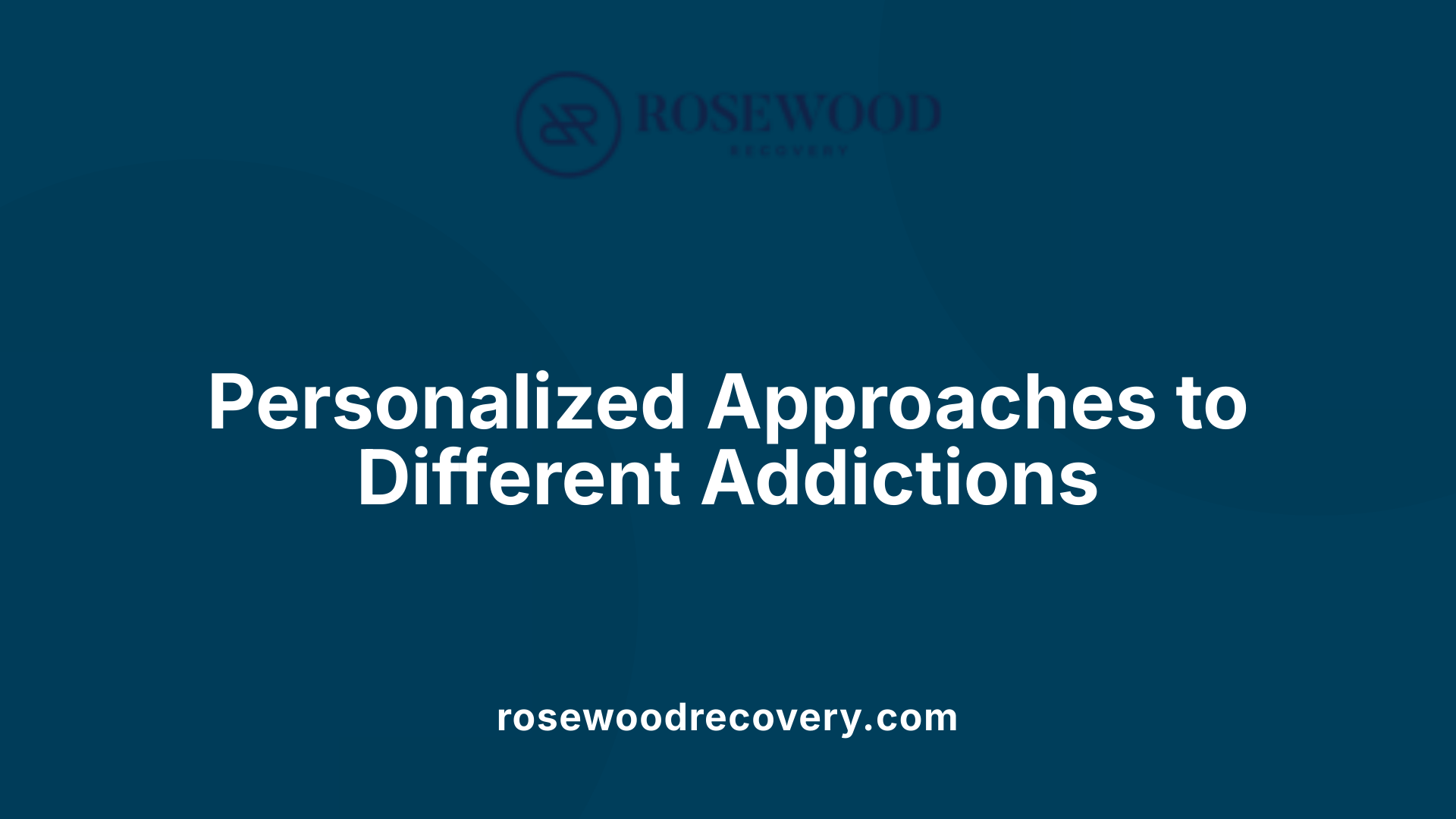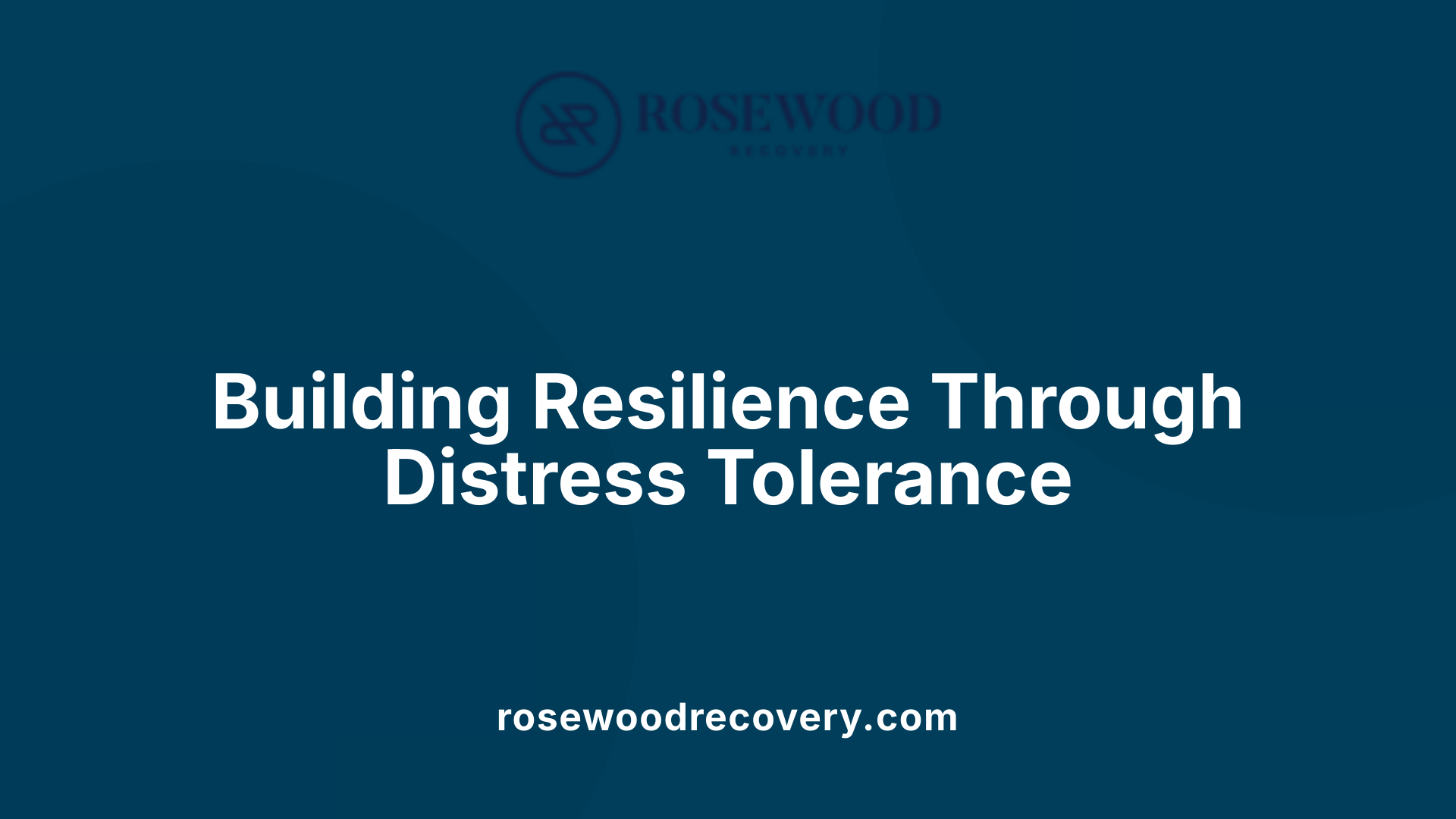Understanding the Role of Distress Tolerance in Addiction Recovery
Distress tolerance is a critical skill set in addiction recovery, enabling individuals to navigate difficult emotions and challenging situations without resorting to substance use. Developing these skills promotes emotional stability, reduces relapse risk, and supports long-term sobriety. This article explores how comprehensive treatment programs incorporate distress tolerance training and evidence-based therapies to empower individuals on their recovery journey.
Comprehensive Treatment Services: A Foundation for Distress Tolerance Development

What Are Comprehensive Treatment Services for Substance Abuse and Mental Health Issues?
Comprehensive treatment services for substance abuse and mental health provide holistic, personalized care that addresses the complex needs of individuals battling addiction and co-occurring mental health disorders. These services typically begin with thorough assessments to tailor treatment plans effectively.
Components Addressing Substance Abuse and Mental Health
Such programs often include detoxification, individual and group psychotherapy, medication management, and long-term support like sober living environments and recovery groups. They integrate evidence-based therapies such as cognitive-behavioral therapy (CBT), dialectical behavior therapy (DBT), EMDR, neurofeedback, and Transcranial Magnetic Stimulation (TMS).
Integration of Therapies Supporting Distress Tolerance Development
A central aspect of these programs is the development of distress tolerance skills—capacities to manage intense emotions and stress without resorting to substance use. Dialectical Behavior Therapy (DBT), for example, encompasses distress tolerance training alongside emotional regulation, mindfulness, and interpersonal effectiveness strategies. This integration helps individuals build resilience, reduce impulsivity, and navigate triggers linked to addiction.
By combining various therapeutic modalities within comprehensive treatment frameworks, providers offer patients multiple avenues to cultivate healthy coping mechanisms. This robust foundation fosters emotional stability essential for long-term recovery and relapse prevention.
How Comprehensive Treatment Programs Address Various Forms of Addiction

How do comprehensive treatment programs address various forms of addiction?
Comprehensive treatment programs for addiction are customized to address the unique challenges of different substances or behavioral addictions. These programs tailor interventions based on the individual's addiction type and severity, ensuring that treatment targets specific needs.
A core component includes evidence-based therapies such as Cognitive-Behavioral Therapy (CBT), Dialectical Behavior Therapy (DBT), and motivational enhancement therapy. CBT helps individuals understand and change unhealthy thought patterns associated with substance use. DBT, which incorporates skills like distress tolerance, emotional regulation, and mindfulness, is especially effective for those struggling with co-occurring mental health disorders and impulsivity that often accompany addiction.
Medication-assisted treatment (MAT) is also incorporated to manage withdrawal symptoms and reduce cravings. This approach supports abstinence or controlled substance use by stabilizing the brain’s chemistry during recovery, making it easier for individuals to engage in therapy.
Family therapy and holistic care complement the clinical approaches by fostering a supportive environment. Family involvement improves communication, supports boundary setting, and helps repair relationships strained by addiction. Holistic methods such as mindfulness, nutrition, and physical activity enhance overall wellness and promote emotional resilience.
Treatment levels vary according to individual progress, ranging from inpatient detoxification to outpatient counseling. This flexibility ensures continued support throughout recovery, maximizing the chances for long-term success.
| Aspect | Description | Benefit |
|---|---|---|
| Tailored Interventions | Customized plans based on addiction type and severity | Targets individual needs for better outcomes |
| Evidence-Based Therapies | CBT, DBT, motivational enhancement therapy | Develops coping skills and manages triggers |
| Medication-Assisted Treatment | Use of medications to ease withdrawal and cravings | Supports abstinence and reduces relapse risk |
| Family & Holistic Approaches | Involves family therapy and wellness practices like mindfulness and exercise | Builds emotional support and strengthens resilience |
This comprehensive approach addresses the complex nature of addiction, offering individuals the tools and support needed to achieve and maintain recovery.
Distress Tolerance: Core Skills and Techniques in Recovery

What is distress tolerance and why is it important?
Distress tolerance is the ability to endure and manage difficult emotions and challenging situations without resorting to harmful behaviors. This skill is especially critical in addiction recovery, where coping with emotional pain healthily can reduce the urge to self-medicate with substances like drugs or alcohol.
What are some common distress tolerance techniques?
Several practical techniques help individuals build distress tolerance, including:
- Distraction: Engaging the mind in different activities to divert focus from distressing thoughts.
- Radical acceptance: Fully accepting reality as it is, which reduces suffering caused by resisting change.
- Self-soothing activities: Using sensory experiences such as calming music or gentle touch to comfort oneself.
- Improving the moment: Visualization, deep breathing, or brief walks to enhance the present experience.
- Pros and cons analysis: Evaluating the benefits and drawbacks of distressing situations to gain clarity.
These methods assist in managing emotional pain in real-time and foster resilience.
How do distress tolerance skills reduce relapse risk and aid emotional regulation?
By equipping individuals with strategies to tolerate distress, these skills reduce impulsive reactions like substance use. Learning to face emotions without avoidance supports emotional regulation, allowing individuals to recognize and control negative feelings. This balanced approach of acceptance and change helps maintain sobriety and supports overall mental health.
How does distress tolerance help manage cravings and triggers?
Cravings often arise from exposure to certain environments, people, or stressful situations. Distress tolerance enables individuals to experience these cravings without giving in, by utilizing coping tools that prevent relapse. Additionally, it aids in handling past trauma and sudden challenges, common triggers in addiction, thus addressing root causes and maintaining long-term recovery.
Dialectical Behavior Therapy (DBT) and Its Role in Developing Distress Tolerance

What is Dialectical Behavior Therapy (DBT)?
DBT is an evidence-based psychotherapy developed in the 1980s to treat severe mental health challenges including addiction. Distinct from traditional cognitive-behavioral therapy, DBT emphasizes validating and accepting uncomfortable emotions rather than avoiding them. It combines mindfulness, emotion regulation, distress tolerance, and interpersonal effectiveness to equip individuals with practical skills for managing emotions and behaviors.
How is distress tolerance integrated into DBT?
Distress tolerance is a core skill set within DBT designed to help individuals endure and cope with intense emotions and crises without resorting to harmful behaviors. Techniques such as radical acceptance, distraction, self-soothing, and improving the moment teach patients how to tolerate emotional pain right in the moment. This skill helps balance acceptance and change, making it easier for individuals to navigate life’s difficulties without self-destructiveness.
What benefits does DBT offer for co-occurring disorders and addiction?
DBT is highly effective for individuals struggling with addiction alongside mental health disorders like anxiety, depression, PTSD, and borderline personality disorder. It supports abstinence by reducing impulsivity, cravings, and emotional triggers related to substance use. DBT also improves interpersonal relationships and helps establish healthy boundaries, which are vital for long-term recovery.
How does DBT address emotional regulation, impulsivity, and relapse prevention?
DBT teaches emotional regulation strategies that enable individuals to recognize and modify negative emotional responses. It also targets impulsivity—a common trait in substance use disorders—demonstrating significant improvements through specialized DBT skills training, especially in alcohol use disorder. By helping patients accept negative feelings without avoidance, DBT promotes emotional stability and resilience. This foundation aids relapse prevention by equipping individuals to manage cravings and triggers linked to their environment or past trauma more effectively.
The Impact of Distress Tolerance on Long-Term Recovery and Mental Health

How does distress tolerance build resilience and emotional stability?
Distress tolerance equips individuals with skills to face challenging emotions without resorting to harmful behaviors. Techniques such as distraction, self-soothing, radical acceptance, and improving the moment promote emotional stability by helping people manage pain in the present. By learning to navigate distress without avoidance, individuals build greater resilience, making it easier to engage in further therapy and sustain recovery.
Why is managing stress crucial to preventing relapse?
Stress is a common trigger for relapse in substance use recovery. By developing distress tolerance, individuals learn to accept and experience negative emotions without impulsive reactions like substance use. This capability reduces the likelihood of self-medicating with drugs or alcohol when confronted with stressful environments, people, or situations, thereby supporting sobriety maintenance.
How is distress tolerance linked to improvements in impulsivity and co-occurring mental health conditions?
Impulsivity plays a significant role in substance use disorders and often co-occurs with conditions such as anxiety, depression, and PTSD. Incorporating distress tolerance skills through therapies like Dialectical Behavior Therapy (DBT) has been shown to decrease impulsive behaviors. Studies reveal that DBT skill training helps reduce emotion-driven impulsivity and cognitive disinhibition, improving emotional regulation and mindfulness, which benefits individuals with co-occurring disorders.
What scientific research supports distress tolerance's effectiveness in recovery?
Research involving DBT Skills Training (DBT-ST) with patients suffering from alcohol use disorder and other substance use disorders demonstrates significant reductions in impulsivity and enhanced distress tolerance. Comparatively, treated patients showed impulsivity levels similar to healthy controls and much lower than untreated individuals. These findings highlight distress tolerance as a mechanism driving meaningful recovery outcomes and mental health improvements.
| Aspect | Description | Impact on Recovery |
|---|---|---|
| Resilience & Emotional Stability | Skills like self-soothing and radical acceptance help manage emotional pain without avoidance. | Builds strength to face challenges, reducing relapse risk. |
| Stress Management | Accepting negative emotions without impulsive reactions lowers relapse triggers from stress. | Supports sobriety by mitigating cravings and unhealthy coping. |
| Impulsivity Reduction | DBT-based distress tolerance training reduces impulsive responses linked to substance use. | Improves emotional control, reducing risky behaviors and aiding co-occurring disorder treatment. |
| Scientific Validation | Studies confirm improvements in impulsivity and emotional regulation following distress tolerance training. | Provides evidence for incorporating distress tolerance in comprehensive addiction recovery plans. |
Enhancing Recovery Through Mastery of Distress Tolerance
Developing distress tolerance skills is foundational for individuals navigating addiction recovery, providing them with healthier coping mechanisms for difficult emotions and stressful situations. Comprehensive treatment programs that integrate evidence-based therapies like Dialectical Behavior Therapy offer practical tools to reduce relapse risk, manage cravings, and address underlying mental health challenges. By fostering emotional resilience, distress tolerance not only supports sustained sobriety but also enhances overall well-being, enabling individuals to rebuild their lives with confidence and stability.
References
- The Role of Distress Tolerance Skills in Addiction Recovery
- DBT for Substance Abuse Treatment
- DBT Distress Tolerance Skills
- How DBT Skills Help With Stress
- Dialectical Behavior Therapy (DBT) for Addiction Treatment
- The Initial Efficacy of Stand-Alone DBT Skills Training for ...
- Home | SAMHSA - Substance Abuse and Mental Health ...
- FindTreatment.gov: Home
- Substance Abuse Recovery & Mental Health Treatment
- Home | SAMHSA - Substance Abuse and Mental Health ...




